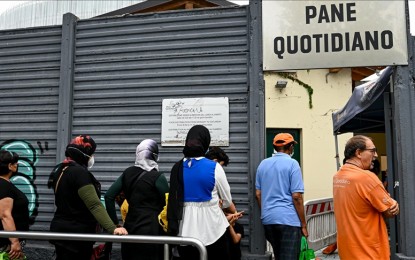
People queue for free food at non-profit association Pane Quotidiano Onlus in Milan, Italy on August 31, 2022 as Italy is hardly affected by surging inflation and higher energy bills. (Piero Cruciatti/Anadolu Agency)
MILAN, Italy – It is 8 a.m. and hundreds of people are lining up and waiting to be served at Pane Quotidiano.
The charity’s headquarters is embedded in a corner on the campus of the University Bocconi of Milan, one of the most expensive and prestigious academic institutions in Europe.
Once the gate opens, dozens of volunteers distribute basic food to beneficiaries, including Italians and families of immigrants, pensioners, and the homeless. They are all here because the cost of living is unsustainable.
“Pane Quotidiano was founded 124 years ago in 1898 by a group of well-deserving Milanese people who thought that bread as a basic element should not be missing from the tables of Italians,” said Luigi Rossi, vice president of the charity.
“From then on, things evolved and in addition to the bread, we distributed yogurt, milk, fruit, cheese, sauce, and ham -- meeting the dietary needs of lunch and dinner. We serve about 3,500 to 4,000 people daily in both centers we run: this one and the one located in the Eastern part of the city. The two together serve more than 1 million food rations per year.”
Queuing for free food every day
Maria Benina Caballero from the Philippines arrived in Italy 21 years ago to work as a cleaner.
She gets a pension of a little more than €500 (USD498), which is not enough to cover her expenses.
“I come here almost every day. In Milan, everything is much more expensive than before and this ration I receive from them is helping me a lot,” she said, concerned about the rising cost of bills.
“This means that I’ll only use candles instead of electricity from now on. But how am I going to cook?” she said.
Retired bartender Lamberto Zannoni, 82, is also worried. He has stood in line outside Pane Quotidiano every day since 2016.
“If I don’t come here every day to get some food, I can’t make it to the end of the month. I live in a flat and I have to pay high living expenses. I heard that the price of bills has increased. I don’t know what I’m going to do next winter: I’m a person suffering from the cold,” he said.
Almost 10 percent of Italians live in absolute poverty
According to Istat, Italy’s office for national statistics, 1.9 million Italian households, and 5.6 million individuals were in absolute poverty last year, beating the previous record in 2020, the year of the beginning of the coronavirus pandemic.
Absolute poverty among foreign nationals is higher -- 29.3 percent more than among Italians at 7.2 percent.
“The problems are getting worse, and new poverty is occurring,” Rossi said.
“Pensions do not get people to the end of the month. Beneficiaries [of the charity] have changed in the last twenty years. Once there were many non-EU citizens, but now the number of Italians has increased and today they are 35 percent of the total of our beneficiaries,” he added.
Economic hardship is spreading and the inflation rate of more than 6 percent could generate 1 million more people in absolute poverty, Istat predicted in its latest report in June.
“When I started working as a volunteer for Pane Quotidiano more than two years ago, poverty was not so visible,” said Anna Geminiani. “After Covid-19, the perception changed and the beneficiaries increased among those who had lost their jobs, caregivers who could no longer carry out their work among families. In recent months, the number of people seeking food rations has increased because of the war. In one single morning, we serve 1,800 people and expect that the numbers could be higher because of the current situation. The beneficiaries include families, pensioners, homeless people, people who do not have an oven to bake at home or gas to cook a meal.”
A difficult winter
The coming winter is expected to be even more difficult.
Coldiretti, the largest organization of farmers at the national and European level with one-and-a-half million members, said an increase in the number of basic food products was recorded in August and estimates that families in the Lombardy region will spend €1.8 billion (USD1.79 billion) more in 2022 on food alone compared to the previous year.
This is due to the explosive mix of rising energy and production costs fueled by the war in Ukraine, combined with record heat and drought that led to a reduction in crop production.
“The key for people to get out of this situation is to eat little and to know how to manage their own money,” said 86-year-old pensioner Augusto Prela, mixing sarcasm with optimism. (Anadolu)
